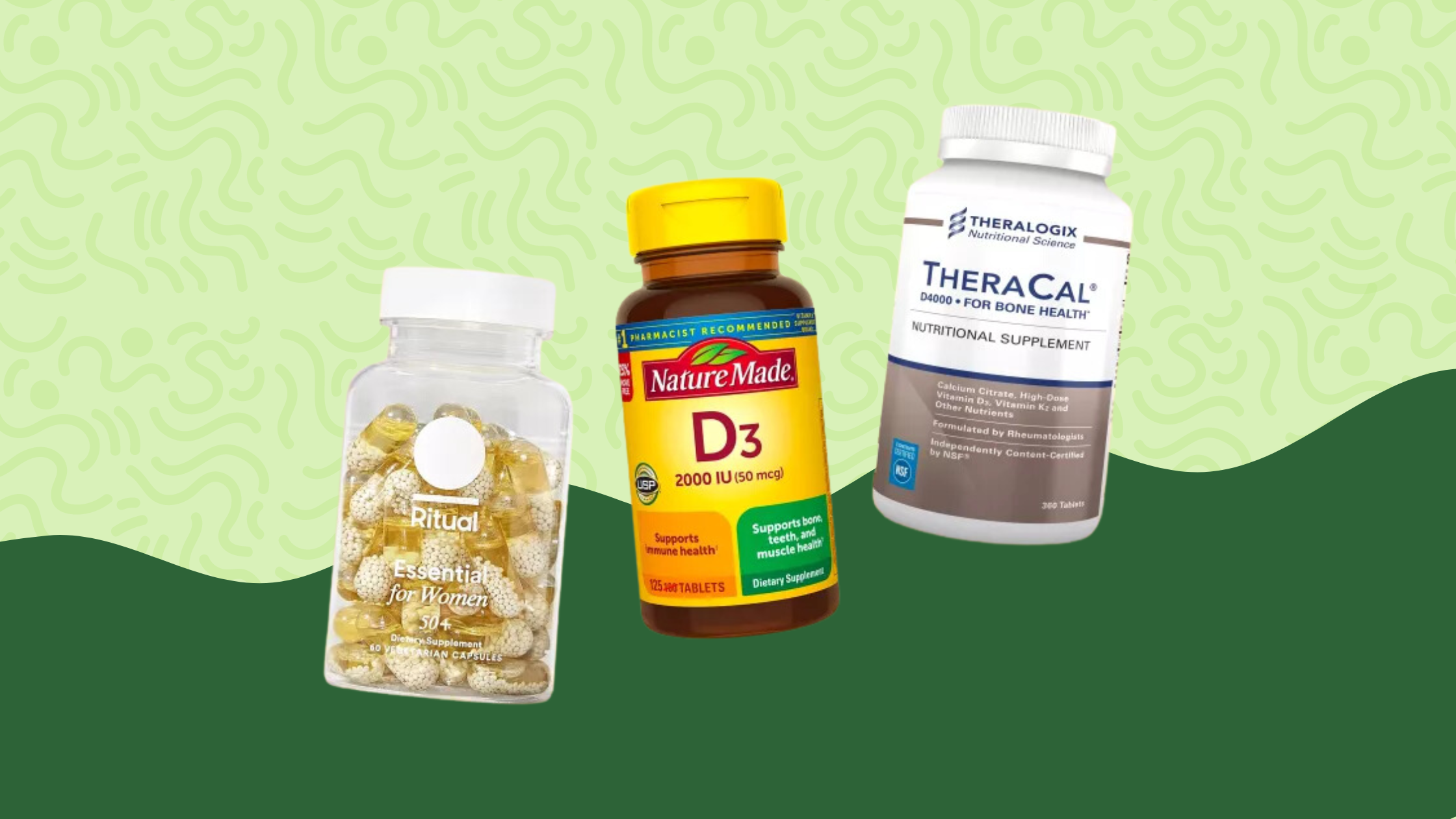


Medically Reviewed By Margaret Etudo, BPharm. Written By The Vitamins For Woman Team.
Recent studies have highlighted the connection between calcium and menopause symptoms, including its role and specific types.
It is surprising that calcium, the most abundant mineral in your body, can be beneficial during menopause. About 99% of calcium is found in your bones and teeth, so its major role in postmenopausal women is to support bone health.
As your body’s nutrient content depletes, you can take calcium to strengthen your bones and ensure your muscles function properly. It also plays a significant role in blood circulation, clotting, hormone production, and nerve transmission.
In this article, you will learn the connection between calcium and menopause symptoms and its benefits in perimenopausal women.

According to the World Health Organization (WHO), most women experience menopause between 45 and 55 years old. Aside from regulating one’s menstrual cycle, estrogen also helps to maintain bone mass density.
During perimenopause and menopause, your body’s estrogen levels drop. This sudden shift in hormone levels blocks the activity of osteoclasts and increases the production of osteoblasts. As a result, your bones deteriorate faster than they are rebuilt, leading to osteoporosis and eventual bone loss.
Studies also show that calcium absorption decreases with age. The serum levels of calcium in postmenopausal women are significantly lower than those of perimenopausal women. This could be due to a decline in the active calcium transport or diffusion component of the calcium absorption system.
Research on the link between calcium and menopause symptoms reveals that it can improve your health differently. Some benefits of calcium in peri-menopausal women include:
As you may have noticed, calcium is a major ingredient in most bone supplements. On average, women lose approximately 1% of their bone mass density every year after menopause.
Increased calcium intake, when combined with vitamin D, boosts bone mass density, reducing the rate of bone loss and resorption. It also reduces the risk of osteoporosis and fractures caused by osteoporosis during menopause.
Calcium is primarily responsible for muscle contraction. The drop in estrogen levels during menopause comes with sarcopenia, the loss of muscle mass.
Aging also affects your muscle’s inability to activate protein synthesis. Increasing your calcium can help you relieve muscle cramps and improve muscle function. As your muscles get stronger and function properly, you will notice that you will sleep better and feel less tired.
Estrogen has a protective effect on your blood vessels and heart. So, you are more likely to have high blood pressure during menopause. Healthy calcium levels help your blood vessels dilate and constrict properly.
Calcium also binds to fatty acids, reducing how your body absorbs lipids. Research also shows that calcium is beneficial in colorectal cancer and obesity. While this may be true, the exact effects and mechanisms are yet to be fully explored.
If you do not take enough calcium, it may have adverse effects on your health. It can also lead to health concerns like:
If you notice any side effects, speak to your healthcare provider immediately. Your doctor can adjust your dosage accordingly or change the supplement entirely.
The recommended dietary amount of calcium is between 1,000 and 1,200 milligrams (mg) daily. If you are between the ages of 19 and 50, you should take 1,000 mg daily. If you are between the ages of 51 and 70, you should take 1,200 mg daily.
As for perimenopausal women, the recommended daily intake is 1,200 milligrams (mg).
Confirming the optimal amounts you need from your doctor is always important. Factors like bone density will influence this recommendation, as well as if you have a pre-existing medical condition(s).
It is always best to get calcium from your diet. However, if you struggle to meet the daily requirements, calcium supplementation can help. There are two major types of calcium supplements for menopause — calcium carbonate and calcium citrate. They vary based on how well the body absorbs them.
This is the most common and affordable form of calcium. Calcium carbonate contains about 40% elemental calcium, providing a significant amount of calcium in a small serving. However, it is more likely to cause gastrointestinal discomfort, such as gas, bloating, and constipation.
Calcium carbonate should be taken with food for optimal absorption. It is the main ingredient in over-the-counter antacids. You can take this form of calcium more than once daily.
This form of calcium is more expensive. It contains 21% elemental calcium, so you may need more pills to meet your calcium requirements. Calcium citrate is easily absorbed in the stomach and can be taken with or without food.
This makes it a better calcium supplement for people with low stomach acid, inflammatory bowel disease, absorption disorders, and those who use acid reflux medications.
Calcium supplements are generally safe for most women. However, there are concerns about the safety of taking too much calcium, which can lead to hypercalcemia.
You may notice symptoms like:
You are more likely to overconsume calcium via supplements. Instead, focus on a calcium-rich diet to meet the recommended dietary allowance.
There are a variety of calcium-rich foods for menopause. Some of the best natural sources of calcium and their milligrams per serving are:
Your body needs vitamin D to absorb calcium. You can eat salmon, egg yolks, and fortified foods, which are excellent sources of vitamin D. The recommended daily allowance for vitamin D for women between 51 and 70 years is 600 international units (15 micrograms).
To help your body to absorb calcium better, follow these guidelines.
Calcium is an essential nutrient. However, there are certain things to keep in mind.
Hormone Replacement Therapy is considered to be the most potent treatment for menopause. During this procedure, your doctor will give you progesterone and estrogen to help manage menopause symptoms. HRT is not suitable for everyone, so your doctor will make a recommendation based on your personal needs.
A multivitamin or nutritional supplement might be enough. Speak to a healthcare professional to prevent interactions between hormones and other medications.
There is no medical evidence that supplements can delay menopause. However, certain supplements can treat menopause and menopause-related symptoms. These include vitamins A, B1, B6, B12, D, and E, magnesium, black cohosh, and omega-3 fatty acids.
The two major forms of calcium are calcium carbonate and calcium citrate. Calcium citrate is used more often during menopause because it is easily absorbed on an empty stomach. Calcium carbonate is more common and affordable but requires food for better absorption.
There’s no medical evidence that any food can stop menopause. However, a healthy calcium intake can make this transition easier. Calcium helps maintain bone health and addresses symptoms associated with menopause, like bone loss, muscle weakness, and fatigue. The recommended daily intake for calcium in perimenopausal and postmenopausal women is between 1,000 – 1,200 mg.
You can also combine calcium with vitamin D to aid absorption. Though generally safe, excessive calcium intake can lead to side effects, so stick to the recommended amounts. If you have concerns about your calcium and menopause requirements, consult your doctor to determine the best type and dosage to avoid potential side effects.

medically reviewed by margaret etudo, BPharm. written by the vitamins for woman team.
hey, does anyone know if calcium supps are really good for bone health in menopause? readin this but still kinda confused.
Very informative article by Vitamins For Woman. Always thought calcium was just for kids. Interesting to see its value in perimenopause.
Yes, FitFrank45, calcium is crucial for aging adults to maintain bone density. Good to spread awareness!
not sure I buy into all this supplement stuff, don’t you think natural sources should be enough? why the big push for pills?
love finding out about how to stay healthy! this article’s super helpful, gonna tell my mom about it! calcium sounds super important.
Ah, calcium. The magic mineral that’s suddenly going to make all my old-age problems disappear. Sure.
It’s crucial to comprehend that while calcium is vital, overconsumption can lead to other health issues. Balance is key.
Anyone knows if too much calcium is bad for kids? This article made me think.
Great, as if I needed another thing to worry about during menopause. Now along with hot flashes, I get to fret over calcium intake. Fabulous.
hey folks, don’t forget about kale and broccoli for calcium, not just milk and cheese. nature’s got what you need!
people always looking for an easy way out with supplements just eat real food
[…] can prescribe conventional drugs like paroxetine and other antidepressants, gabapentin, and calcium to treat symptoms such as depression, muscle pain, and […]
[…] This will require you to take up to 1,200 milligrams of calcium in a day. Knowing the right amount of calcium to help ease your menopause symptoms is important. You can also get calcium from dairy foods, leafy greens, seeds, nuts, and […]
[…] in soy foods can improve your muscle and bone density, as well as reduce your body weight. Certain calcium supplements can also reduce the risk of osteoporosis and other bone density issues in menopausal […]
[…] Calcium and vitamin D are essential for postmenopausal women. As oestrogen levels drop, bone density decreases, increasing the risk of osteoporosis. Calcium and vitamin D protect against menopause-related osteoporosis by strengthening the bone and boosting bone mass density. […]
[…] is associated with a decline in bone density due to lower oestrogen levels, increasing the risk of osteoporosis. Prebiotics improve calcium and magnesium absorption, which […]
[…] Calcium and vitamin D are essential for postmenopausal women. As oestrogen levels drop, bone density decreases, increasing the risk of osteoporosis. Calcium and vitamin D protect against menopause-related osteoporosis by strengthening the bone and boosting bone mass density. […]
Your article helped me a lot, is there any more related content? Thanks!
[…] powerful duo that helps maintain skeletal integrity and reduce joint pressure. Vitamin D enhances calcium absorption in the intestines, supports immune regulation, and may reduce inflammation that affects […]
[…] Read: Calcium And Menopause Symptoms: How Much Is Needed? […]
Your point of view caught my eye and was very interesting. Thanks. I have a question for you.